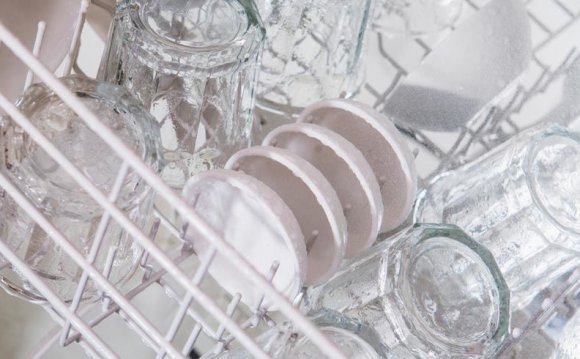
Looking for an inexpensive and effective way to clean your eyeglasses? Then, give dish soap a try. It works just as well as (if not better than) specialty lens cleaners, and is even recommended by the American Optometric Association.
What You Do:
Rinse your glasses under warm (not hot) water to remove any dirt or debris that might scratch the lenses. Then, rub a small drop of dish soap into each lens.
Clean the frames too, if they need some attention. Then, rinse your glasses off; wipe them dry with a soft, clean cloth; and voila – perfectly clean glasses in seconds!
For the best results, stick to a basic, non-citrus dish soap. The acid in orange or lemon-scented dish soap could harm the coating on your glasses. It's best to avoid moisturizing dish soaps, too. They could leave residue behind on your glasses, which will undo your cleaning efforts.
Why This Works:
Dish soap is designed to cut through food and grease, so it does a good job of dissolving the oils from your skin and any stuck on dirt that may be on your glasses. And since it's been formulated to leave drinking glasses streak-free; it'll leave your eyeglasses streak-free, too.
Benefits of Using Dish Soap to Clean Eyeglasses
- won't discolor lenses, like ammonia-based glass cleaners
- won't damage the anti-glare or scratch-resistant coatings on your glasses, like vinegar, ammonia and other household cleaners
- cheaper than store-bought eyeglass cleaner
- environmentally-friendly
- no harsh chemicals or smells
- won't scratch your glasses, like dry cleaning could
- nothing extra to buy. Just use the dish soap you already use to clean your dishes
Clean Your Glasses on the Go
Find yourself reaching for your shirttail whenever you notice a smudge on your glasses?
If you're serious about keeping your glasses scratch-free, it's time to retire that habit. Just make your own on-the-go glasses cleaner by combing three parts rubbing alcohol and one part water in a spray bottle. You can even add a couple drops of dish soap to get that oil-fighting power. that you're used to. Then, label the bottle, and keep it in your purse or briefcase. Be sure to spray your lenses liberally when you clean them, so they don't get scratched. There's no need to rinse this solution off when you're done cleaning your glasses.
Deep-Clean Your Glasses
Nose pads tend to yellow over time, and sometimes the nose piece will even oxidize. If this happens, you can usually take your glasses back to where you bought them to ask for a free nose pad replacement. Many stores also offer free ultrasonic cleanings, which can help to remove any build up that you're not able to get off of your glasses at home. Take advantage of these freebies, and you may be able to go longer between replacement pairs.









